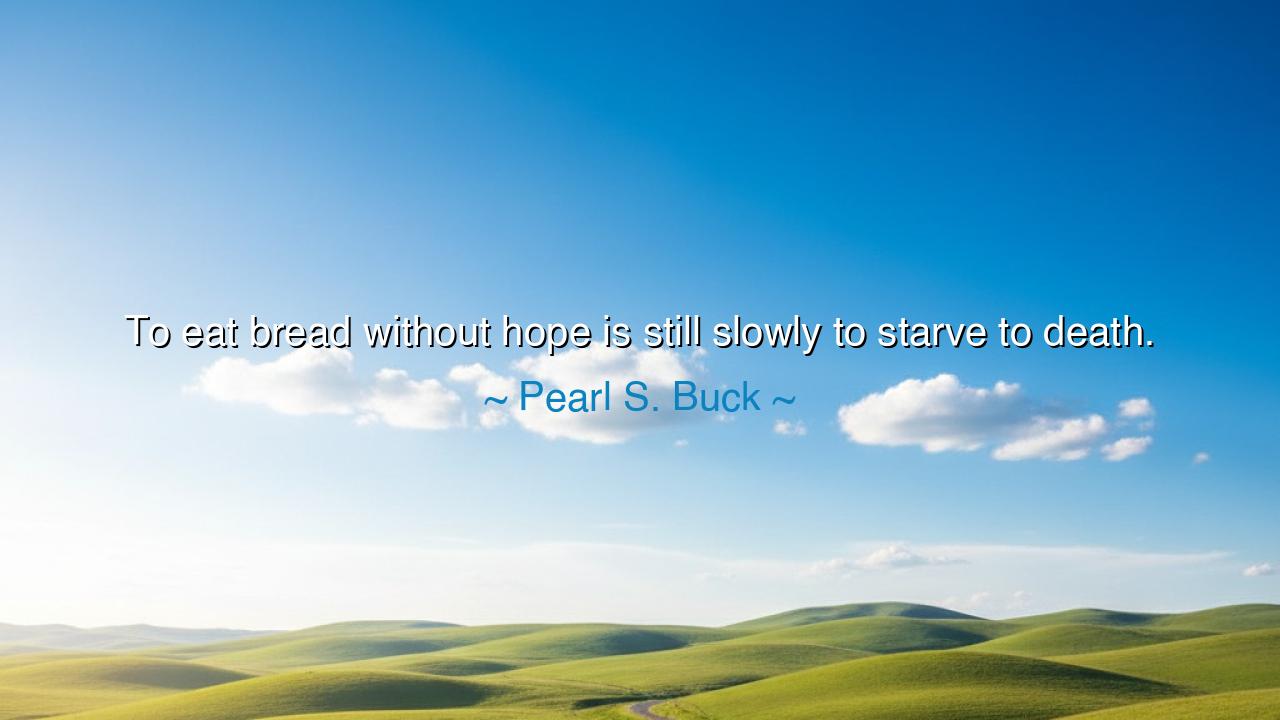
To eat bread without hope is still slowly to starve to death.






“To eat bread without hope is still slowly to starve to death.” Thus spoke Pearl S. Buck, the great chronicler of human endurance, who gave voice to the soul of the poor and the laboring. In this single line, she unveils one of the deepest truths of existence—that hope is not a luxury of the spirit, but the very sustenance of life. Bread may nourish the body, but it is hope that nourishes the soul. Without it, one may live outwardly yet die inwardly, walking as a shadow among the living. For what is life, if stripped of meaning, purpose, and faith in tomorrow? Buck’s words remind us that man is more than flesh; he is a creature of longing, sustained not only by food but by the fire of belief.
The origin of this quote can be traced to Buck’s deep compassion for the human condition, born from her years among the farmers of China—a people who endured hunger and hardship, yet held fiercely to hope. She saw in their faces a kind of sacred dignity, a defiance against despair. In her stories, especially The Good Earth, the peasants live by their toil, yet what truly keeps them alive is their faith that life, however cruel, can still yield a harvest of meaning. Thus, when Buck says, “to eat bread without hope is still slowly to starve to death,” she speaks of those who survive materially but perish spiritually—the men and women whose bellies are full but whose hearts are empty.
The ancients, too, knew this truth. The philosophers of Greece and Rome wrote that hope is the breath of the soul. Seneca, the Stoic sage, taught that even in chains, a man who holds to hope is freer than the tyrant who despairs. Hope is the bridge between present suffering and future joy; it is the invisible hand that lifts the weary from the dust. To live without it is to wither slowly, as a plant deprived of sunlight. Pearl S. Buck, with the wisdom of both East and West, saw that man’s hunger for hope is more constant than his hunger for bread, for even when food is scarce, hope can make life bearable—but when hope is gone, even abundance turns to ash.
Consider the story of Viktor Frankl, the psychiatrist and survivor of the Nazi concentration camps. Amid starvation and cruelty beyond measure, he discovered that those who endured were not always the strongest, but those who held to a reason to live—those who still hoped. He saw that when a prisoner lost faith in tomorrow, his body followed soon after. The body cannot live long when the soul has surrendered. Frankl later wrote, “Those who have a why to live can bear almost any how.” In this, his testimony joins Buck’s: the one who eats without hope—without a “why”—is still starving, though he feeds.
Bread in Buck’s quote stands as a symbol of all earthly sustenance: wealth, comfort, even security. These things can sustain existence, but they cannot sustain life. For life, in its truest sense, is not measured by breathing and pulse, but by meaning and purpose. The modern world, rich in bread yet poor in hope, often forgets this. Men feast but are not satisfied; they have everything yet feel empty. They starve amid plenty because they have lost their hope—their faith in something greater than themselves, their vision of a future worth living for. Buck’s wisdom cuts through centuries to remind us: without hope, all abundance is famine.
But hope does not come cheaply. It must be cultivated, like grain in the field. It requires courage—to believe amid despair, to dream amid ruin. Pearl S. Buck, writing through the storms of war and change, knew that hope is an act of defiance. It is not naïve optimism but sacred resistance. To hope is to declare that darkness will not have the final word. And when she speaks of “slowly starving to death,” she warns that cynicism—the belief that nothing can change—is the most dangerous hunger of all. For the body can be revived with bread, but the spirit once starved of hope becomes barren ground.
So, my child, take this teaching to heart: feed both your body and your soul. Seek bread, but never without purpose; strive for comfort, but never without meaning. When hardship comes, guard your hope as you would your breath. Remember that despair, though seductive, is slow death disguised as truth. Cultivate hope through gratitude, through service, through the pursuit of beauty and kindness. For as Buck teaches, to eat without hope is not truly to live. But to live with hope, even in hunger, is to be fully alive—to taste eternity in the simplest crust of bread.






AAdministratorAdministrator
Welcome, honored guests. Please leave a comment, we will respond soon